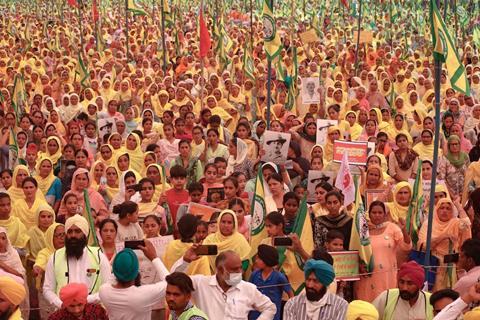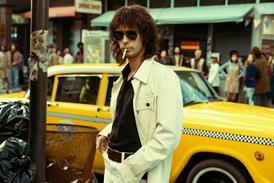Hot Docs winner follows Indian farmers as they unite to protest damaging government laws

Dir: Nishtha Jain. India/France/Norway. 2024. 105mins
Revolutions do not come easy, requiring patience and resilience as much as righteous fury. Indian filmmaker Nishtha Jain documents the 13-month-long protest her country’s farmers waged against the government starting in 2020, incensed by new laws that allowed private companies greater agricultural rights and threatened individual farmers’ precarious financial stability.
Pays tribute to this movement’s dogged determination
Eschewing phoney uplift or slick production values, Farming The Revolution boasts a journalistic seriousness, observing how the authorities and the media conspired to demonise dissent. A happy ending ultimately awaits viewers (and the farmers), but not before Jain thoroughly illustrates the sacrifice and tragedies that eventually brought about positive change.
Farming The Revolution premiered at Hot Docs, where its Best International Feature Documentary Award win will help boost its profile. Jain has earned acclaim for socially-conscious documentaries such as 2012’s Gulabi Gang (about the nation’s poorest women) and 2022’s The Golden Thread (about jute workers’ fight for better pay), and Farming The Revolution could be especially potent for viewers incensed about economic inequality and increasing global corporatization. This David-versus-Goliath tale should see further fest play.
In September 2020. in the midst of Covid-19, the Indian government laid out controversial, business-friendly new agricultural laws, despite the fact that Parliament opposed the measures. (Opening text suggests that “the laws put [the] livelihoods of 800 million people at stake.”) Outcry quickly sprung up among farm unions, which formed massive protest camps that occupied critical entry points into Delhi.
Jain introduces us to a few notable individuals, including activist Veerpal Kaur and movement head Joginder Singh Ugrahan, but she is more interested in the collective force of motivated farmers who refused to stop speaking out against these laws. Farming The Revolution gains moral weight not from rousing speeches but, rather, wide shots of teeming humanity gathered together, day after day, in solidarity against a government that seems unconcerned about their crippling economic woes. (As one observer points out, “The total debt burden of farmers in India is 144 billion USD.”) While revolutions need leaders, the documentary subtly suggests that perhaps we overrate the importance of charismatic figureheads — ultimately, it is the people who have the power.
The film, which is co-directed by Akash Basumatari (who also serves as cinematographer), avoids crowd-pleasing inspirational scenes. Instead, Farming The Revolution pays tribute to this movement’s dogged determination, emphasising the months of stalemate as the government refuses to meet with the group or discuss their demands. The drudgery of impassioned resistance takes centre stage, with promising developments quickly undercut by setbacks, violence or death. (During the film’s finale, onscreen text mentions that 702 farmers died during the 13 months of protest.) At one point, in frustration at the standstill, prominent activist Rakesh Tikait threatens to die by suicide. Jain never stops reminding audiences of the sheer length of the farmers’ opposition, occasionally providing a count of how many days the protest has dragged on.
Jain’s understated approach has drawbacks, producing a narrative arc without the usual highs and lows of a conventional story. But if Farming The Revolution risks repetitiveness, the film insightfully highlights why movements fail: the leadership loses focus; the rank-and-file protestors run out of enthusiasm. Those obstacles could have befallen these farmers, and there are certainly moments in which their will seems broken — especially during a peaceful demonstration that frighteningly transforms into a riot due to some extremists. As a result, the media uses the violence to smear the protestors and discredit their cause. But such instances of intense drama are outnumbered by the slow, steady work of the farmers’ daily protests and the building tension between the government and the people.
When a satisfying resolution finally comes, though, even that is tempered by cruel reality. Although the Indian authorities eventually repealed the onerous laws, the government went back on certain promises, which spurred farmers to begin protesting anew this year. There are no clear-cut victories in Farming The Revolution — just an acknowledgment of the long, hard war that so many workers face across the planet in their battle to survive. The film invites the viewer to join that struggle, but it has no illusions about just how demanding the fight will be.
Co-director: Akash Basumatari
Production companies: Raintree Films, Little Big Story, Piraya Film
International sales: Cinephil, shoshi@cinephil.com and suzanne@cinephil.com
Producers: Nishtha Jain, Valerie Montamartin
Screenplay: Nishtha Jain, Valerie Montamartin, Deborah Matzner
Cinematography: Akash Basumatari
Editing: Giles Gardner, Nishtha Jain, Anand Gautam
Music: Florencia Di Concilio







![MYSUNSHINE_Charades[1] copy](https://d1nslcd7m2225b.cloudfront.net/Pictures/274x183/0/3/6/1423036_mysunshine_charades1copy_416976.jpg)













![MYSUNSHINE_Charades[1] copy](https://d1nslcd7m2225b.cloudfront.net/Pictures/100x67/0/3/6/1423036_mysunshine_charades1copy_416976.jpg)


